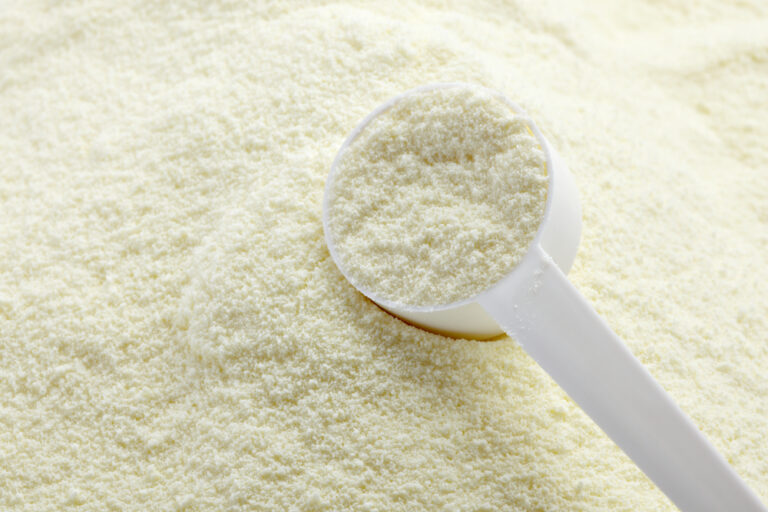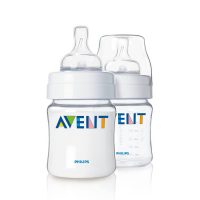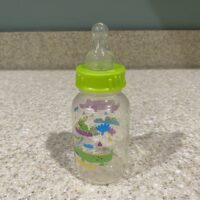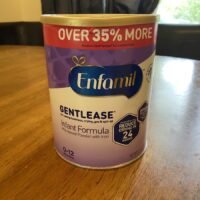Editor’s Note
As of May 2022, many formulas have become increasingly difficult to find. Please read our article, What To Do If You Can’t Find Baby Formula, for more information regarding the formula shortage.
Drawing on my own experience as a foster parent of a medically complex infant, plus hours of research and discussion with current preemie parents, I’ve listed the best infant formulas for preemies, including hypo-allergenic alternatives. Here, you are provided with answers to the most frequently asked preemie feeding questions. Along with the advice of doctors, you can explore these best infant formulas for preemies outlined below.
Nutritional Needs of Premature Infants
Infants who are born early often require a specialized nutrition plan once they are discharged from the hospital. Recommendations vary by gestational age, and when medical issues are present. In general, the caloric needs of premature infants are nearly double those of full-term infants (source). This is due to the higher metabolic demands of normal growth and further organ development. In addition, when premature infants are born with a heart problem, need surgery, or develop an infection, extra calories are needed. The growth parameters of premature infants are plotted on specialty growth charts that accommodate lower birth weights and lengths. Research shows some benefits of breastmilk in premature infants, and many receive small feedings during their time in the NICU (source). Preemie infant formulas, however, are often recommended which are designed to support these babies as they continue to grow.
The gastrointestinal system is not fully developed in premature infants, especially those born prior to 30 weeks gestation. The ability to digest lactose develops around 34 weeks gestation (source). Infants born prior to this age may experience gassiness or discomfort during the first few days of life (source). Special nutritional considerations are important for infants born prior to 32 weeks. They are at risk for a condition called necrotizing enterocolitis. In such cases, the small intestines become inflamed, resulting in the accumulation of gas, and, occasionally, bowel perforation (source). For those infants at risk, parents may receive specific guidance from a neonatologist or pediatrician regarding feeding amounts and frequency. Necrotizing enterocolitis differs from lactose intolerance of prematurity in that symptoms are more severe, and develop between ages two to four weeks.
Best Preemie Formula
Similac NeoSure
Similac NeoSure is specifically formulated for premature infants. The intent is to provide extra calories, protein, fats, carbohydrates, vitamins, and minerals for accelerated growth during the first year of life.
All formulas are required to contain such ingredients, but the calories per ounce is higher in those designed for preemies. The objective is to promote growth in the key infant parameters: head size, weight, and length.
NeoSure is an easy-to-digest cow’s milk-based formula.
- So exactly what is NeoSure formula? This formula contains:
- DHA and ARA – these additives, which occur naturally in breastmilk, have been shown to improve eye and brain development in some studies.
- Calcium and vitamin D – for baby’s growing bones
- Lutein – for eye development
- Vitamin E – cell development nutrient also found in breast milk
The manufacturer claims that, “Preterm infants fed Similac NeoSure throughout the first year of life showed significantly increased lean body mass, and less fat mass at 12 months corrected age.” The company studies showed that this formula improved visual acuity at 6 months corrected age, as well as early language development at 14 months corrected age.
It should be noted that some parents reported their baby experienced excessive gassiness and constipation upon starting this formula. However, this seemed to self-resolve with continued use. Similac NeoSure comes in three preparations – 2 fl. oz. ready to feed bottles, a 1 qt. container of ready-to-feed formula, and a canned powder to be mixed with water.
This best formula is the “Best Formula for Premature Babies” on our Best Baby Formula list, too.
Gerber Good Start Soothe HMO Formula
There really aren’t many preemie infant formula options on the market. For many preemies, the two or three most commonly recommended options may not be tolerated. Trying a standard infant formula may not be out of the question, but discuss this with your healthcare provider before switching. Formulas for full-term infants may have fewer calories per ounce, but they definitely have the basic ingredients your baby needs to grow strong and healthy.
What I like about Gerber Good Start Soothe HMO Formula is that it’s relatively similar to premature infant formulas. It contains human milk oligosaccharide (HMO), a prebiotic fiber that occurs naturally in breast milk. It’s beneficial for baby’s digestion, and immune system development. Many moms may prefer a formula with this ingredient as a way to provide a component of breastmilk for their baby (source). The addition of HMO may also help protect against necrotizing enterocolitis (source).
The other quality that makes this infant formula a potential option for preemies is the inclusion of what Gerber has coined “comfort proteins.” The high-quality whey protein is partially hydrolyzed during processing. This breaks down the proteins into smaller particles, making them easier to digest and absorb. This can be beneficial for preemies as well as full-term babies who suffer from colic, gassiness, or fussiness.
Other bonuses include the addition of probiotics, and DHA for eye and brain development. This infant formula is also free of artificial growth hormones. Gerber Good Start Soothe with HMO is not a high calorie formula, however, so discuss with a doctor whether or not this option is appropriate for your preemie.
Enfamil NeuroPro Enfacare
Enfamil NeuroPro EnfaCare like NeoSure, was developed to help premature babies achieve growth milestones during the first few months at home. With an enriched formulation and expert-recommended levels of DHA and ARA, Enfamil EnfaCare is a cow’s milk-based formula that can support your baby’s healthy development.
In 2018, MFGM (milk fat globule membrane) was added to this formula to help support brain development and immunity. It’s an ingredient found in breastmilk, making this formula a stellar choice for preemies.
Enfamil’s manufacturer claims that, “Premature babies fed this formula during the first year have achieved catch-up growth similar to that of full-term, breastfed infants.” There are three formula preparations: 2 and 8 fl. oz. ready to feed bottles, and a powdered version that must be mixed with water. Parents reported more stomach discomfort in preemies who drank this formula compared to competitor products. It also contains corn syrup solids which some parents are against.
Similac Organic Non-GMO Infant Formula
When in doubt, go organic to give your preemie the best possible nutrition. With Similac Organic Non-GMO Infant Formula you get a high quality formula made with cow’s milk free of antibiotics and rBST. Moreover, organic nonfat milk is the first ingredient in this formula instead of sugar.
Not only did they omit GMOs, but also pesticides and other harmful ingredients. There is no corn syrup on the ingredient list as the company opted to use organic sugar instead, a rare occurrence. There is no palm oil as well. Instead, healthier sunflower, soy, and coconut oils are included. Other beneficial ingredients are DHA, vitamin E, nucleotides, antioxidants, and essential vitamins and minerals.
The only negative aspect of this formula is the use of maltodextrin, an additional sweetener. At least, however, it is organic and sourced naturally.
As with the Gerber formula previously discussed, this is not an infant formula specifically designed for premature infants. Be sure to talk to your doctor first. If he or she feels it is the right option, it is possible to give this formula throughout the first full year of your baby’s life.
Hypoallergenic Preemie Formula
If you are considering a hypoallergenic formula, I urge you to consult with your baby’s pediatrician or neonatologist to avoid any problems. In most cases, this type of infant formula would be initiated during your baby’s NICU stay because of a milk protein allergy, with the recommendation to continue it after discharge. The current options are Similac Alimentum, Enfamil Nutramigen, or Neocate. All of these infant formulas, have the standard amount of calories per ounce. Your baby’s healthcare provider may suggest a specific fortifier to ensure that your baby consumes the correct amount of calories. Always discuss a possible change to a hypoallergenic formula with a healthcare provider. An insufficient intake of calories will result in poor weight gain. In addition, evidence of any benefit for premature infants in the absence of cow’s milk allergy is inconclusive (source).
Selecting the Best Formula for Preemies
The use of infant formulas for premature infant nutrition is a common practice. Science Direct, a leader in scientific, technical, and medical research, states that many micropreemie infants receive formula as their primary source of nutrition during their hospitalization because breastmilk is unavailable. Standard cow’s milk infant formulas are designed for the caloric needs of full-term infants, and are manufactured based on the composition of mature breast milk. The amount of protein, calcium, and phosphate may not be sufficient for the nutritional needs of stable and growing preterm infants. Soy infant formulas are also nutritionally inadequate for preemies (source).
Therefore, when breastmilk feedings are not possible, preterm infant formulas are the best option. According to Gerber Medical, the nutritional goals for preterm infants are to continue meeting their increased metabolic needs, promoting catch-up growth and development, supporting GI function, and building their immune system. The best preemie formula will contain adequate amounts of protein, essential for infants born at an early gestational age, and have a good protein/caloric ratio.
Similac NeoSure and Enfamil NeuroPro Enfacare are specifically formulated for preemies, and are enriched with nutrients such as calcium, magnesium, and phosphorus (source). They also have more calories per ounce, and a higher protein content. These formulations help your baby gain the essential lean mass needed in order to thrive successfully from hospital to home.
*Source: NINA R. O’CONNOR, MD, American Family Physician. 2009 Apr 1;79(7):565-570.
Important Benefits
- Higher calorie count (22 cal/oz)
- An increased amount of protein
- A higher calcium to phosphorous ratio
- Proven growth benefits
Precautions
- Warming formula in microwaves is risky because it can cause serious burns.
- Since premature infants do not have fully developed immune systems, exercise caution with powdered formula versions. Powdered formulas have been found to harbor bacteria (source). They should only be used at the recommendation of your doctor, and after taking steps to reduce the risk of infection.
Preemie Formula Comparison Table
The table below compares only the recommended products on this page. A low or high Price means it is low or high compared to the other products listed. The Popularity Score reflects how often readers click on and buy the product. The Quality Score is our assessment of the overall performance and satisfaction with the product compared to others in the table.
| Enfamil NeuroPro Enfacare | 9.6 | 9.4 | 174.99 |
| Similac NeoSure | 9.9 | 9.6 | 149.94 |
| Similac Organic Non-GMO Infant Formula | - | 9.0 | - |
| Gerber Good Start Soothe HMO Formula | 3.9 | 9.6 | - |
FAQs – Preemie Formula
How do I use the ready-to-feed bottles?
- Do not use if opened, or if the breakaway ring is damaged or missing.
- Ready to feed formula already contains the correct percentage of water. Do not add more. Additional water can dilute the effectiveness of the formula (source). This is especially concerning for preemies who need to receive a high concentration of nutrients in each ounce they drink.
- Shake very well.
- Twist off cap.
- Twist on clean nipple and ring. (To avoid contamination, wash your hands thoroughly before applying the nipple to this product. The formula is already sterile, so this practice will maintain it)
- Use this product within 1 hour of initiating a feeding.
- Keep sealed and at room temperature, avoiding storage in locations with temperature variations (i.e. garages).
- Bottles are not reusable.
- Keep away from direct light.
- It is best to keep the bottles in their carton until ready for use
How do I use the ready-made formula?
- Do not use if the band around the cap or inner foil seal is damaged.
- As mentioned above, do not add water.
- Always shake well.
- Check for damage when you take off the protective band. Clean the cap before using it.
- Invert cap; press down to pierce foil, then turn the cap a half turn.
- Remove foil.
- After inserting a cap, pour the formula into a clean bottle, and attach a clean nipple.
- Once feeding begins, use within 1 hour or discard.
- Use the entire 1 Qt. container within 48 hours after it is opened. Any is unused formula should be discarded.
- Store at room temperature until opened, and then store in the refrigerator.
- Bottles may be prepared in advance, and keep them in the refrigerator for 48 hours.
How should I use powder preparation?
- It is extremely important to maintain strict hygiene when using powdered formula.
- If in doubt, ask your doctor for the correct procedure.
- In some cases, your doctor may recommend sterilization by using boiled water with the formula.
- It is always advisable to clean bottles, nipples, and rings with hot water and soap.
- Always wash cleaning utensils as well as your hands and preparation surfaces.
- Fill the bottle to the desired level with water first.
- Use 1 unpacked level scoop for every 2 fl oz of water.
- Return dry scoop to can.
- Cap bottle; shake well; attach nipple.
- Once feeding begins, use within 1 hour or discard.
- Premixed bottles should be stored in the refrigerator, and used within 24 hours.
- Powdered formula should be stored at room temperature.
- Once opened, a can of formula should be used within one month.
How long should your baby use preemie formula?
There is no specific timeframe for how long you’re baby should take preemie formula. Depending on their health and needs, they may need to stay on preemie formula for 3, 6, or even 12 months. This can be discussed at regularly scheduled well visits during the first year of life, during which growth parameters are measured. You and your doctor can determine together when to stop using preemie formula.
Where can I get more information about caring for my premature infant?
Healthychildren.org, powered by the American Academy of Pediatrics, has a wonderful website filled with informative and helpful information for parents of premature infants. This website provides more than just help with feeding, and even includes a section on dealing with the stress of a NICU stay.
Final Thoughts
You’ve ridden the NICU roller coaster and came out on the other side. It wasn’t an easy ride, and now you’re looking at a variety of baby formulas. During this time, you have most likely experienced some of the scariest moments of your life. If I could offer you one piece of advice, it would be to accept the help of the medical community. Anything they offer you – therapists, nutritionists, social workers, assistive devices, etc – to ease your transition home, take it. It will make your days and nights easier while giving you additional peace of mind. It takes a village to raise a baby. Accept their help, and build your village.
Embrace each tender, God-given moment with your precious little one. He chose you, Momma. He handpicked you to care for this tiny, new life. You can do this! You were made for this. Throughout your journey, I want you to remember this one thing – although we don’t know you personally – all of us here at Experienced Mommy, myself included, are praying for you. Parents of preemies and special needs children are our unsung heroes. May God bless you on the days, nights, and years ahead.










